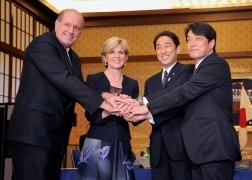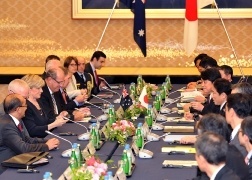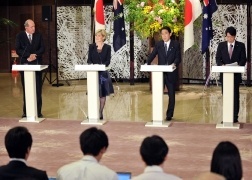Oceania
Fifth Japan-Australia Joint Foreign and Defense Ministerial Consultations (“2+2”)
June 11, 2014



On June 11 the Fifth Japan-Australia Joint Foreign and Defense Ministerial Consultations (“2+2” Ministerial Meeting) were held. The outline of the Consultations is as follows. The joint press statement(PDF) and other materials released following the Consultations are as per the attached documents.
and other materials released following the Consultations are as per the attached documents.
 and other materials released following the Consultations are as per the attached documents.
and other materials released following the Consultations are as per the attached documents.The Consultations were attended on the Japanese side by Minister for Foreign Affairs Fumio Kishida and Minister of Defense Itsunori Onodera, and on the Australian side by Minister for Foreign Affairs Julie Bishop and Minister for Defense David Johnston. The Consultations were held from 6:30 p.m. to 7:35 p.m., followed by a joint press conference and a working dinner.
1. Opening Remarks
The outlines of each minister’s opening remarks are as follows:
(1) Foreign Minister Kishida
I am pleased to hold the first “2+2” under the Abe and Abbott administrations. Japan and Australia are “strategic partners” and in recent years have been advancing security and defense cooperation in various fields. Prime Minister Abbott’s visit to Japan in April this year produced results in the area of security and defense, and this meeting is extremely meaningful following up those results.
(2) Defense Minister Onodera
Defense Minister Johnston and I met each other on three occasions over the past month. We enjoy having an amicable relationship like family. When the two countries undertook relief operations in the wake of the Philippines typhoon disaster, I also met with Foreign Minister Bishop at the site. Additionally, Japan and Australia also performed important roles in the search operation for the Malaysian aircraft, and I met with Defense Minister Johnston when I visited Perth in April. I hope that the relationship between the two countries will continue to be strengthened onward.
(3) Australian Foreign Minister Bishop
This is my fifth meeting with Minister Kishida. I am pleased at the progress being made in cooperation between Japan and Australia in the area of security and defense, and hope to leverage this opportunity to further elevate such cooperation into a new stage. Japan and Australia have a relationship based on shared values and interests. In particular, Australia believes that it is meaningful for Japan to perform regional and global roles, including an exercise of the right of collective self-defense. It is also important to coordinate with the U.S., not just between Japan and Australia, and I hope that cooperation between Japan, the U.S. and Australia in the area of security and defense also moves forward in a practical manner.
(4) Australian Defense Minister Johnston
Japan is one of my favorite countries. I have also visited the country in a personal capacity in the past. The fact that Australia has held discussions with Japan frequently since the change of the Australian Government last September evidently shows how important Japan is as a strategic partner. In the cooperative relationship for Japan and Australia, security and defense cooperation is one of the extremely important pillars. I hope to discuss joint exercises and technical cooperation in particular.
2. Situational Awareness
(1) Minister Kishida stated that he wishes to enhance common understanding with Australia on (i) the situation in the East China Sea and the South China Sea; (ii) cooperation with countries in the region including ASEAN member countries; (iii) the contribution of U.S. engagement; and (iv) regional architecture (the East Asia Summit, etc.).
(2) Foreign Minister Bishop showed her support, wishing to continue to advance coordination and cooperation between Japan and Australia with regard to the regional situation and cooperation in various organizations.
(3) Minister Onodera explained to the ministers on the Australian side that a Chinese military fighter aircraft made an unusually close approach to Japan Self-Defense Force aircraft again on June 11, following a similar incident on March 24. He stated that (i) the Ministry of Defense takes such dangerous activities very seriously and has lodged a protest through diplomatic channels; and (ii) at the same time, in order to avoid further unexpected incidents between Japan and China the Ministry of Defense will continue to convince China so that the operation of the maritime communication mechanism between Japan and China defense authorities can be initiated promptly. Minister Onodera also expressed the recognition that he opposes unilateral attempts to change the status quo by force, which was shared by the four ministers.
(4) The Ministers reconfirmed the importance of the rule of law, and reconfirmed the recognition that the use of force or coercion to unilaterally change the status quo in the East China Sea and South China Sea will be strongly opposed in particular.
(5) Minister Kishida again explained Japan’s position regarding the North Korea issues. He said he wants Japan and Australia to continue to cooperate in seeking concrete actions from North Korea toward resolving pending problems, including the abductions issue, the nuclear as well as the missile issues, to which the Australian side showed their support.
3. Japan-Australia Security and Defense Cooperation
(1) The Japanese side explained the Government of Japan’s security and defense policy, and that it will contribute even more actively in securing the peace, stability and prosperity of the international community through the policy of “Proactive Contribution to Peace” based on the principle of international cooperation. The Japanese side also explained that Japan’s path as a peace-loving nation remains unchanged. The Australian side expressed its support for Japan’s efforts.
(2) The four Ministers confirmed to cooperate in a complementary manner in the Pacific region including the Pacific Island countries by taking advantage of each strength.
(3) The recognition was shared that U.S. engagement is vital to regional peace and stability, and that the framework of Japan, the U.S. and Australia should be maintained and strengthened, so as to further foster trilateral cooperation.
(4) The substantive conclusion was reached on the Agreement between the Government of Japan and the Government of Australia concerning the transfer of defense equipment and technology. Additionally, the Ministers discussed preparation for joint research in the field of marine hydrodynamics as an initial area of science and technology cooperation for prime ministerial consideration.
(5) They confirmed a suite of recommendations as a means of elevating bilateral security and defense cooperation to a new level, based on the Japan-Australia Joint Declaration on Security Cooperation of 2007. The recommendations include options for strengthening joint exercises, enhancing people-to-people exchanges, deeper cooperation on humanitarian support and disaster relief, maritime security, peacekeeping operations and capacity building, as well as stronger trilateral security cooperation. The four ministers discussed measures for further elevating the cooperative relationship between Japan and Australia, and reached a shared conclusion, which will be reported to the leaders of Japan and Australia in the form of recommendations.
(6) The Ministers reconfirmed arrangements for a Maritime Self-Defense Force vessel to participate in the Albany Convoy Commemorative Event that is scheduled to be held in late 2014 (this event will mark the centenary of the departure of the first convoy of ships carrying Australian and New Zealand Army Corps (ANZAC) troops to World War I, which was escorted by the Japanese naval cruiser HIJMS).
(7) The view was shared that the Japan-Australia cyber policy dialogue, which was decided to be set up at the Japan-Australia Summit Meeting in April, will be utilized to respond to common threats in cyberspace, and to jointly engage in strengthening regional and international cooperation. Additionally, the view was shared that the promotion of cooperation in the area of space security will also continue.
(8) The Ministers reconfirmed the effectiveness of the Japan-Australia cooperation on the United Nations Mission in the Republic of South Sudan (UNMISS).

